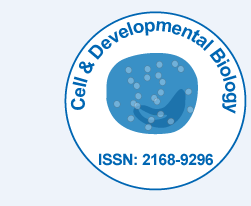
Cell & Developmental Biology
Open Access
ISSN: 2168-9296

ISSN: 2168-9296
Opinion - (2024)Volume 13, Issue 3
Cyclin-Dependent Kinase Inhibitor (CKI) proteins are important regulators of cell cycle progression, cell proliferation, and differentiation. Their complicated roles extend beyond cell cycle regulation to influence diverse cellular processes during development and disease. This article explores the multifaceted functions of CKI proteins in orchestrating cellular fate decisions and their implications for both normal development and pathological conditions.
Role of CKI proteins in cell cycle regulation
CKI proteins, including p21, p27, and p57, serve as pivotal regulators of the cell cycle by inhibiting the activity of Cyclin- Dependent Kinases (CDKs). These proteins exert their inhibitory effects by binding to and inhibiting the activity of CDK-cyclin complexes, thereby controlling the transition between cell cycle phases. For example, p21 inhibits the G1/S transition by binding to and inhibiting the activity of cyclin- CDK complexes involved in DNA replication initiation. Similarly, p27 and p57 regulate the G1/S and G2/M transitions, respectively, by inhibiting the activity of CDK-cyclin complexes responsible for cell cycle progression.
Regulation of cell proliferation
In addition to their role in cell cycle regulation, CKI proteins exert influence over cell proliferation through mechanisms independent of CDK inhibition. These proteins modulate the activity of key transcription factors and signaling pathways involved in cell growth and survival. For instance, p27 can inhibit the activity of the transcription factor E2F, thereby suppressing the expression of genes involved in cell proliferation. Moreover, CKI proteins regulate cellular senescence, a process characterized by irreversible growth arrest, by promoting the expression of senescence-associated genes and suppressing pathways that promote cell proliferation. Dysregulation of CKI proteins can disrupt these processes, leading to aberrant cell proliferation and contributing to the development of diseases such as cancer.
Involvement in developmental processes
CKI proteins play essential roles in embryonic development, where they regulate cell fate determination, tissue patterning, and organogenesis. During development, CKI expression patterns are dynamically regulated to control cell proliferation and differentiation in a spatiotemporal manner. Disruption of CKI function can lead to developmental defects and congenital abnormalities, highlighting their importance in embryogenesis.
Implications in disease pathogenesis
Dysregulation of CKI proteins is associated with various diseases, including cancer, neurodegenerative disorders, and cardiovascular diseases. In cancer, alterations in CKI expression or activity contribute to uncontrolled cell proliferation and tumor progression. Conversely, restoration of CKI function can suppress tumor growth and promote apoptosis, highlighting their potential as therapeutic targets in cancer treatment.
Therapeutic opportunities
The pivotal roles of CKI proteins in regulating cell proliferation and differentiation offer therapeutic opportunities for treating diseases characterized by abnormal cell growth. Targeting CKI signaling pathways are potential for developing novel and efficient therapeutic strategies to control cell proliferation, induce differentiation, and inhibit tumor growth. Moreover, modulation of CKI activity could potentially enhance the efficacy of existing cancer therapies and overcome drug resistance.
CKI proteins play critical roles in regulating cell proliferation and differentiation during development and disease. Their multifaceted functions extend beyond cell cycle regulation to influence various cellular processes, including transcriptional regulation, signaling pathways, and cellular senescence. Understanding the molecular mechanisms underlying CKI function provides insights into disease pathogenesis and identifies potential therapeutic targets for intervention. Further research into the roles of CKI proteins in development and disease will deepen our understanding of cellular processes and inform the development of novel therapeutic strategies aimed at controlling cell proliferation and differentiation in pathological conditions.
Citation: Vanhov J (2024) CKI Proteins in Development and Disease: Regulation of Cell Proliferation and Differentiation. Cell Dev Biol. 13:345.
Received: 30-Apr-2024, Manuscript No. CDB-24-31246; Editor assigned: 03-May-2024, Pre QC No. CDB-24-31246 (PQ); Reviewed: 17-May-2024, QC No. CDB-24-31246; Revised: 24-May-2024, Manuscript No. CDB-24-31246 (R); Published: 31-May-2024 , DOI: 10.35248/2168-9296.24.13.345
Copyright: © 2024 Vanhov J. This is an open-access article distributed under the terms of the Creative Commons Attribution License, which permits unrestricted use, distribution and reproduction in any medium, provided the original author and source are credited.